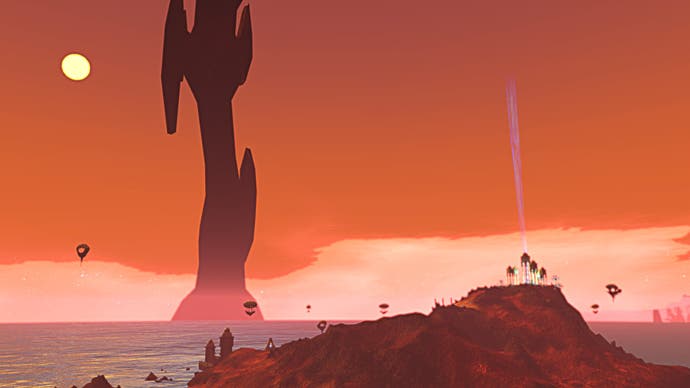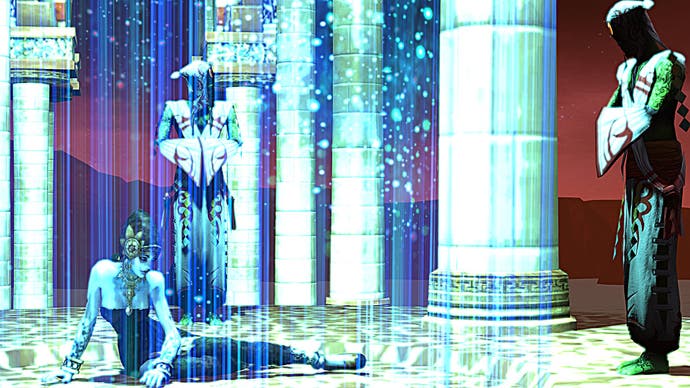Otherland
The virtual world about virtual worlds.
Telemorphic capacity is what will allow you to change your own appearance, modify the stats of your virtual equipment, morph your gun into a sword, and adjust your avatar's abilties as you see fit (though there may be some specialisation later on) in an advancement system that Real U describes as "very organic and deep". It's all about bring able to suck information from the world around you -and that includes other players, who you can "hack into" in order to steal their information, take or copy their items, or plunder their virtual remnants after "death". The lower your telemorphic capacity, the more of the "real you" you expose, and the more vulnerable you are (not just in combat - NPCs or players might decide not to do business with you, for example).
Computer viruses will be a key tool. These can be bought from places like the Bazaar, plundered from enemies, generated through a crafting component of the game, and traded much like traditional MMO equipment. There will be situations where you'll want to infect hostiles with a virus, or even yourself; you can protect yourself from them with colour-coded shields, or by trying to outrun the "data ghost" goes that passes on the infection. Another tool will be the "Zoomer", an avatar mod that acts as a sort of data-capture sniper-rifle, capturing snapshots of the world and mining them for information. It will lock onto targets, but locking on will set off alarm bells for the victim.
Radical new system - or merely elaborate set-dressing for the usual RPG numbers game? At the moment, it's impossible to tell. We didn't see any of these bizarre interactions running, and many concepts remain bafflingly beyond our grasp. Real U stressed that non-combat goals would be common - often set by characters from the books - but couldn't elaborate much on what they'd be.
Either way, it's frankly a fascinating set-up. The sheer, wild stylistic abandon of the game - we see a character gallery of medieval knights, mutants, grotesquely fat Victorian caricatures, walking angelpoise lamps, coarsely pixellated Tron-like simulations - is invigorating enough, and the code system makes a perfectly twisted sense as a way of tying this disparate multiverse together.

The potential for expanding the Otherland universe is, naturally, also limitless. Williams' books contain enough raw material for years of game content, but he's ready and willing to expand the story beyond them. "This is my sequel," the author says. There will be a "post-story" game, after you've completed the phases of the existing worlds, where players could actually amass enough wealth to become the world-running evil in the system. User-generated content, anyone?
The more you think about Otherland, the more questions you have. There's time enough for Real U to answer them. The game is in pre-production only, some 15 per cent complete, and due to be released in 2010. It's running on a modified Unreal Engine 3 and envisaged as a fairly high-end PC game, with 1080p visuals on a quad-core PC the benchmark - something they studio feels won't be too outlandish in two years' time. Quixotically, Real U is also working on 3D mouse support for object manipulation and a social gesture system that, unlike everyday emotes, can be used to influence NPCs.

Otherland is also, its makers claim, being designed for truly global success - part of the rationale behind Real U's establishment in Singapore, that most Western of Eastern cities. Support for any and every business model, from subscription to micro-transaction, is being built into the game in an effort to make it ready for every market. Real U and dtp's ambition, quite simply, knows no bounds. It doesn't entirely fill you with confidence - the history of MMOs is littered with well-funded studios with grand ideas that never saw the light of day, or did, and failed. But it does fill you with wonder.
The appeal of Otherland's basic premise - an MMO that has the potential to be anything you want it to be - is as easy to grasp as the specifics are hard. It's being realised by a team that's passionate and serious about what it's doing. It must be one of the most original, thought-provoking and intellectually exciting games in development anywhere, and although you might be a fool to bet on its success, you'd be a churl to bet against it. Because, in the all-too-conservative world of MMOs, Otherland is exactly the kind of unlikely story we need.
